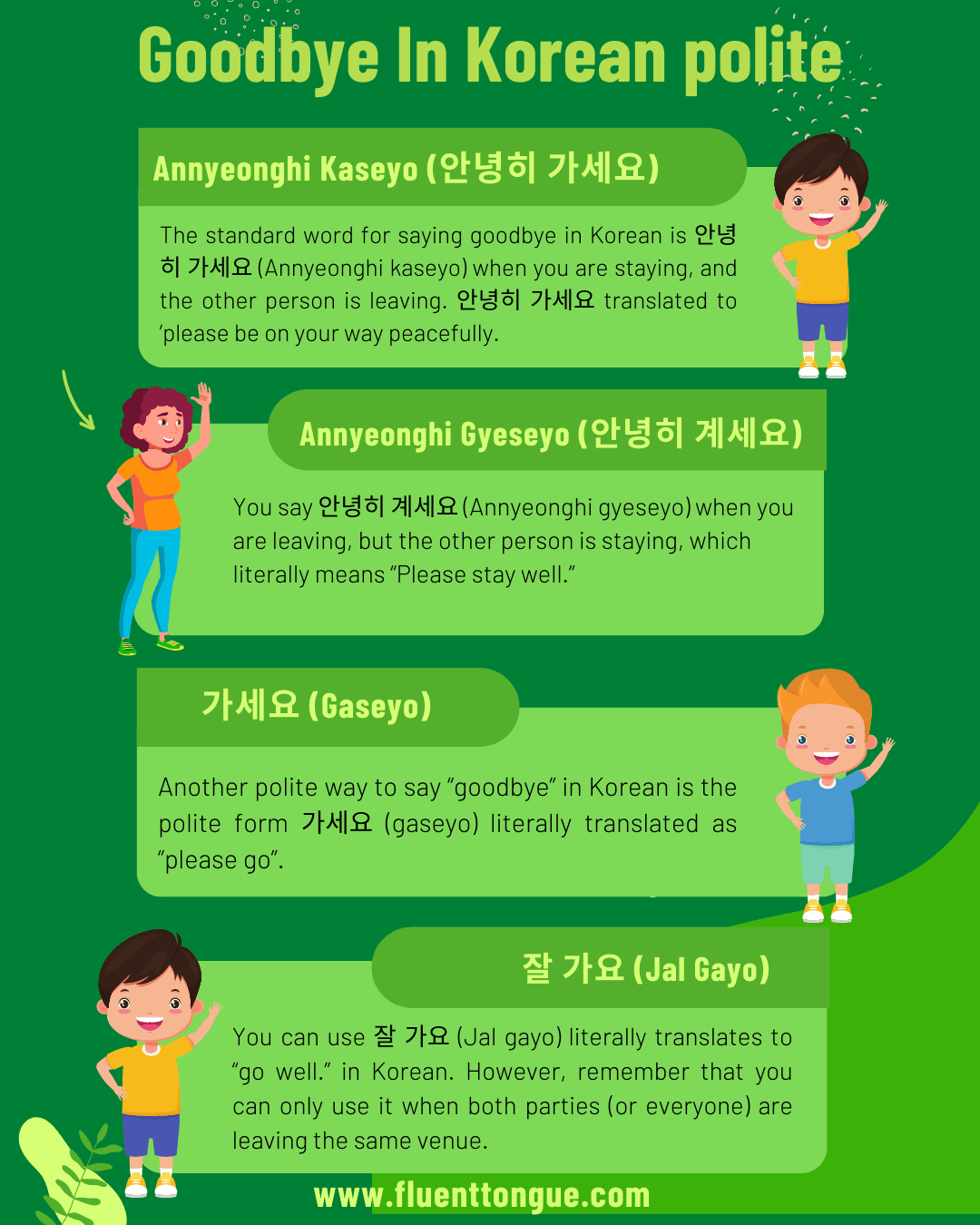You don’t get a second chance to make a first impression, and knowing how to say “hello” and “how are you in Korean” will ensure you get brownie points.
Koreans don’t really say How are you in Korean directly to their friends and family but you have heard 잘 지내셨어요? (jal jinaesyeosseoyo)?’. It has more likely been, “How have you been?”
But Koreans use different phrases for different situations.
This article will give you 15 different ways to ask “How are you in Korean”, ranging from formal to informal expressions and some of the most common Korean greetings.
Alright friends, let’s get started.
How to say “How Are You in Korean?”
The translation of ‘How are you?’ in Korean is 잘 지내셨어요? (jal jinaesyeosseoyo)?’ means” ‘Have you lived well?’. ‘잘’ means’ well ‘and 지내셨어요? came from the verb ‘지내다’means’ “to live.” You can also say 잘 있었어요? (jal isseosseoyo) means “have you been well?”. You can only use it with people you know but have not seen in a long time.
As you can see, it is not a direct translation of ‘How are you?’ Unlike English, just say hello and go straight to the point.
Remember to use formal or informal forms depending on the age of the person you are talking to.
Here’s a list of how to say “How are you” in Korean from formal to informal.
- 잘 지내셨어요? (jal jinaesyeosseoyo?) – formal
- 안녕히 계셨어요? (annyeonghi gesyeosseoyo?) – formal
- 잘 있었어요? (jal isseosseoyo?) – standard polite
- 잘 지냈어? (jal jinaesseo?) – informal
- 잘 있었어? (jal isseosseo?) – informal
Let’s discuss each of them in detail
“How Are You?” in Korean (standard)
Here are the four polite ways to say “How Are You?” in Korean you can use when you meet someone you know after a long time.
- 잘 지냈어요? (Jal Ji Nae Sseo Yo)-How are you?
- 어떻게 지냈어요? (Eotteoke Ji Nae Sseo Yo)-How’s it going lately?
- 밥 먹었어요? (Bap Meogeo Sseo Yo)- Have you eaten?
- 요새 별일 없죠? – Nothing special these days, right?
When to use
- Talking to someone older
- Someone who is similar age as you but not close
- Teachers or professors or bosses
- People with higher status than you (age, rank, etc)in society
잘 지냈어요? (Jal Ji Nae Sseo Yo)-How are you in korean?

The most standard way to say ‘how are you?’ in Korean is 잘 지냈어요? (Jal Ji Nae Sseo Yo)’ means” ‘Have you lived well?’. ‘잘’ means’ well ‘and 지냈어요 came from the verb ‘지내다’means’ ‘to live’.
How to response
| Response | Polite | Causal | Formal |
| I am fine | 저는 잘 지냈어요 (jeoneun jal jinaesseoyo) | 나는 잘 지냈어(naneun jal jinaesseo) | 잘 지냈습니다 (jal jinaesseumnida) |
| I am not fine | 저는 잘 못 지냈어요 (jeoneun jal mot jinaesseoyo) | 나는 잘 못 지냈어 (naneun jal mot jinaesseo) |
Example
- How are you?
- 잘 지냈어요?[jal jinaesseoyo?]
You can respond as
- I’m good. (yes I’ve been well)
- 네, 잘 지냈어요.[ne, jal jinaesseoyo.]
잘 있었어요? (jal isseosseoyo?) – standard polite
잘 있었어요? (jal isseosseoyo?) means have you been well where 잘 means well . it is the standard polite version. To ask this question to your friends/ someone younger than you , just use the phrase 잘 있었어(jal isseosseo).
어떻게 지냈어요? (Eotteoke Ji Nae Sseo Yo)-How’s it going lately?

어떻게 지내세요 in literal translation, is ‘how have you been spending your time? which basically means ‘how are you’. It is made up of two words such as 어떻게 (Eo-tteoh-ke) means “how” and 지내다(Ji-nae-da) means “to spend time or live”.
How to response
| Response | Polite | Causal |
| I am so so | 저는 그저 그렇게 지냈어요 | 나는 그저 그렇게 지냈어 |
| How aboout you? | 당신은요? | 너는? |
How have you been?-어떻게 지내셨어요?
어떻게 지내셨어요?Eo-tteoh-ke Ji-nae-shuh-sseo-yo? Means How have you been. This is a formal way. So you can use it with people older than you. To friends/ people younger than you, you can use 어떻게 지냈어?Eo-tteoh-ke Ji-nae-sseo?
밥 먹었어요? (Bap Meogeo Sseo Yo)- Have you eaten?

Have you eaten in Korean is 밥 먹었어요? (Bap Meogeo Sseo Yo) Where 밥[bap] means rice/meal. In Korean culture, it’s not uncommon to ask ‘have you eaten?’ as a way of saying ‘how are you?’ when someone meets you around lunch or dinner time.
How to response
| Response | Polite | Causal |
| Yes, I have | 네, 먹었어요 | 밥 먹었어 |
| No, not yet | 아니요, 아직이요 |
“How Are You?” in Korean (informal)
Here are the four causal ways to say “How Are You?” in Korean. you can use when you meet someone you know after a long time.
- 잘 지냈어? (Jal Ji Nae Sseo)-
- 잘 있었어? (Jal Isseo Sseo)-
- 어떻게 지냈어? (eotteoke jinaesseo)-
- 밥 먹었어? Have you eaten? (informal – This is used as a greeting in Korean.)
When to use
- Close friends and people who are younger than you.
- Siblings
- Parents (but not traditionally)
잘 지냈어? (Jal Ji Nae Sseo)

잘 지냈어? (Jal Ji Nae Sseo) is the causal way to say ‘how are you?’ in Korean 잘 지냈어요? means” ‘Have you lived well?’.
As you can see, the only difference between these two sentences is that ‘yo’ (요) is the second one. So removing ‘yo’ (요) makes it more informal. You can use it freely with friends, and people younger than you.
How to response
| Response | Polite | Causal | Formal |
| I am fine/good | 저는 잘 지냈어요 (jeoneun jal jinaesseoyo) | 응, 잘 지냈어. (eung, jal jinaesseo) | 잘 지냈습니다 (jal jinaesseumnida) |
| I am not fine | 저는 잘 못 지냈어요 (jeoneun jal mot jinaesseoyo) | 나는 잘 못 지냈어 (naneun jal mot jinaesseo) |
Example
- How are you?
- 잘 지냈어?[jal jinaesseo?]
You can response
- I’m good. (yes I’ve been well)
- 응, 잘 지냈어.[eung, jal jinaesseo.]
Here, eung (응) is the casual way of saying ‘yes’ in Korean.’
if you want to know more about how to say yes in Korean, here’s a complete guide different ways to say yes in formal, causal situations.
잘 있었어? (Jal Isseo Sseo)
To ask this question to your friends or someone younger than you, just use the phrase 잘 있었어(jal isseosseo). It means have you been well. So removing ‘yo’ (요) from the formal phrases잘 있었어요? (jal isseosseoyo?) makes it more informal.
How to response
| Response | Causal |
| I am fine | 응, 잘 지냈어.[eung, jal jinaesseo.] |
| I am not fine | 나는 잘 못 지냈어 (naneun jal mot jinaesseo) |
어떻게 지냈어? (eotteoke jinaesseo)-
To ask this question to your friends/ someone younger than you, just use the phrase 어떻게 지냈어? (eotteoke jinaesseo) means How have you been?
So removing ‘yo’ (요) from the formal phrases어떻게 지내셨어요? makes it more informal.
How to response
| Response | Polite | Causal |
| I am so-so. | 저는 그저 그렇게 지냈어요 (jeoneun geujeo geureoke jinaesseoyo) | 나는 그저 그렇게 지냈어 (naneun geujeo geureoke jinaesseo) |
| just so-so | 그저 그래요 (geujeo geuraeyo) | 그저 그래(geujeo geurae) |
밥 먹었어? Have you eaten? (informal)

밥 먹었어요? (Bap Meogeo Sseo Yo) means Have you eaten where 밥(Bab) means Rice/Meal and 먹다 means to eat. it is very common to ask ‘have you eaten?’ as a way of saying ‘how are you?’ around lunch, or dinnertime
How to response
| Response | Polite | Causal |
| Yes, I have | 네, 먹었어요 | 밥 먹었어 |
| No, not yet | 아니요, 아직이요 |
How to say Long time no see in korean?

when you are greeting someone you haven’t seen for a long time, you can say phrases like 오랜만이에요(Oh-raen-man-e-eh-yo) means Long time no see in korean. It came from the word 오랜만 (Oh-raen-man) means ‘after a long time’. In causal situation you can say 오랜만이야.
How to response
| Response | Polite |
| Yes, It’s been a long time! | 네, 오랜만이에요! |
Yes, It’s been a long time! | 응, 오랜만이야 |
How to say i miss you in korean?

When you miss someone because you haven’t seen them for a long time and want to know how they are now.
보고싶었어요(Bo-go-ship-uh-sseo-yo) means I miss you in Korean and it came from the word 보고싶다 (Bo-go-sib-da) means ‘I miss you’. You can say 보고싶었어(Bo-go-ship-uh-sseo.) when talking with friends.
Anyway, knowing how to say I miss you in Korean is important too.
- Formal – 보고싶었어요(Bo-go-ship-uh-sseo-yo)
- Informal – 보고싶었어(Bo-go-ship-uh-sseo.)
How to response
| Response | Polite | Causal |
| Me too! | 저도요! | 나도! |
Me too, I missed you! | 저도요, 저도 보고싶었어요! | 나도, 나도 보고싶었어! |
10 native ways to respond to ‘How Are You?’ in Korean.
Now that you know how to say ‘How are you?’ in Korean, you are probably wondering how to answer this question.
Here are some common ways to answer when somebody asks you ‘잘 지냈어요?’:
- 네. 잘 지냈어요. = Yes. I have been well.
- 좋아요 (johwayo) – Good
- 안 좋아요 (an johwayo) – Bad, or not good
- 나는 바쁘게 지냈어 i I’ve been busy.”(informal)
- 너무 잘 지냈어요. = I’ve been very well.
- 기분이 별로예요 (gibuni byeolloyeyo) – I’m feeling bad.
- 나쁘지 않아요 (nappeuji anayo) – I’m not feeling bad.
- 아주 잘 지냈어요. = I’ve been very well.
- 잘 못 지냈어요. = I’ve not been well.
- 바쁘게 지냈어요. = I’ve been busy. (polite)
- 덕분에 잘 지냈습니다. = I’ve been good thanks to you.
- 그냥 그래요. = So, so.
- 요새 너무 힘들어요. = It’s so hard these days.
- 요새 몸이 좀 안 좋아요. = I’m not feeling well these days.
- 요새 행복해 죽겠어요. = I’m so happy these days.
Korean speech levels or politeness levels
If you learn Korean grammar, it’s important to remember that the Korean language is hierarchical, which means that it has different levels.
Koreans are very particular about the level of formality and politeness in speech.
If a person you just met wants to know your age or your date of birth, don’t be surprised if they ask.
It’s also not unusual for most Koreans to want to know your age before addressing you.
There are seven speech levels in Korean. However, the most common levels are formal and informal.
Formal speech level
Using formal speech shows respect to someone of authority.
To a government official, your boss, or a customer in the service industry, write down what they say.
For formal business settings and formal broadcasts, this is the proper use of the abbreviation.
If you are interested in 사극, you’ll hear the language used during the Korean royal court. It’s a highly formal language and is not usually used today.
Standard Korean speech
This is what you should expect to hear in everyday life.
This is used in everyday speech, with people you work with, or with someone you don’t know very well.
Causal speech level
If you don’t want to sound overly formal, use this style of speech when conversing with friends or people who are younger.
How to say “hello” and “goodbye” in Korean

If you’re learning how to say “how are you” in Korean, it’s a good idea to know already know how to say “hello” and “goodbye” as well.
Yes, you can say 안녕 (annyeong) for both hello and bye in Korean but that would be impolite in most cases.
안녕하세요 (annyeong haseyo) is the standard way of saying “hello” in Korean. But there are many other ways to say hi in Korean.
If you want to know in detail, you can read our complete guide to saying “hello” in the Korean language.

To say goodbye in korean, you can either use the phrases 안녕히 가세요 (annyeonghi gaseyo) or 안녕히 계세요 (annyeonghi gyeseyo), depending on who’s leaving or staying.
Here’s a complete list of ways to say “goodbye” in Korean if you want to know more.
5 real-life phrases For ‘How are you?’ In Korean your textbook doesn’t tell you
Here are some other similar expressions you can use when you want to ask, “How are you?” in Korean.
- Are you busy ?-바빠요[bappayo]
- Nice to meet you.만나서 반가워요.[mannaso bangawoyo]
- Are you okay now?-이제 괜찮아?[ije gwaenchanh-a?]
- I missed you!-보고 싶었어요![bogo sipossoyo]
- Long time no see!-오랜만이군요!-[oraenmanigunnyo]
Conclusion
Voila! That completes our list of a number of different ways to say “How are you in Korean”.
Variety is the spice of life, so we encourage you to try as many of these as possible whenever you got a chance.
You don’t have to remember them all.
In case of doubt, just say hello and go straight to the point.
The next time you say how are you in Korean language, you will be able to understand as well as ask it back!
Other useful resources to learn more

https://quizlet.com/411744007/korean-how-are-you-flash-cards/
https://quizlet.com/de/228104234/korean-how-are-you-flash-cards/
How many of these expressions have you used? Which ones are new to you? Let us know in the comments!